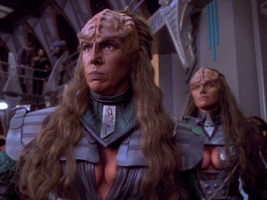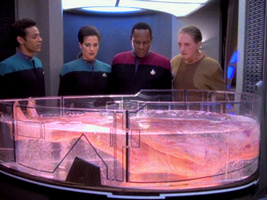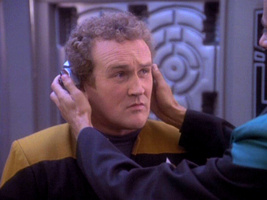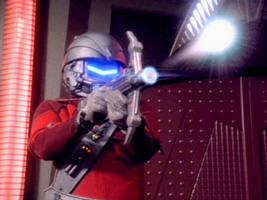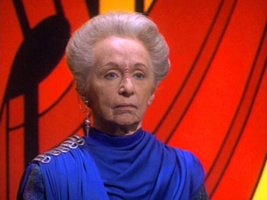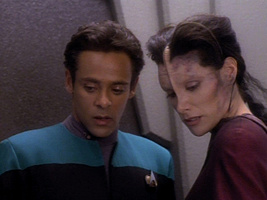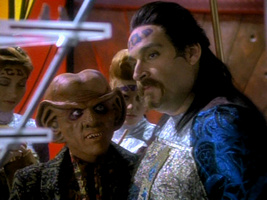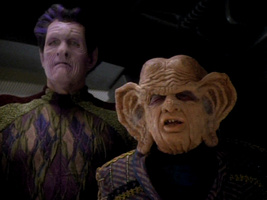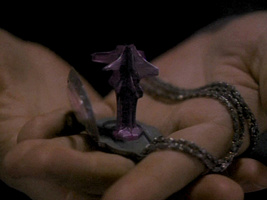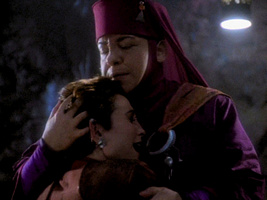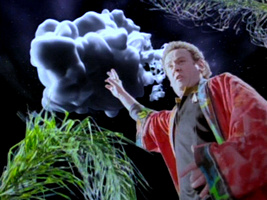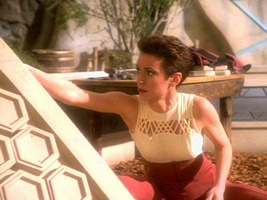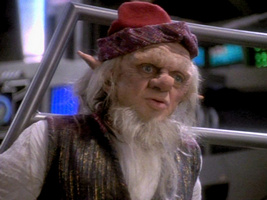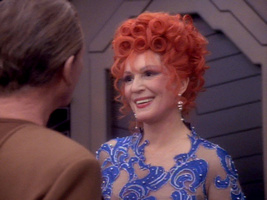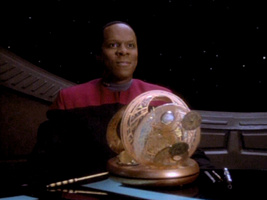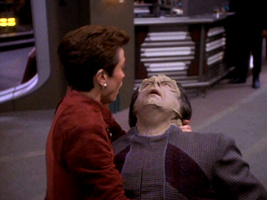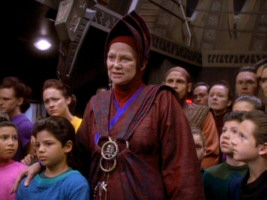Deep Space Nine (DS9) Season 1 Guest Reviews
Season 1Season 2Season 3Season 4Season 5Season 6Season 7
Emissary
Synopsis
Stardate 46378.1: Three years after losing his wife at the Battle of Wolf 359, Commander Benjamin Sisko is assigned as the new commander of a plundered space station, orbiting the planet of Bajor. Having liberated themselves from sixty years of Cardassian rule, the newly-established Bajoran provisional government is seeking Federation assistance for the task of rebuilding their beleaguered planet, after it was pillaged by their former oppressors. The discovery of the first stable wormhole into the Gamma Quadrant adds a strategic significance to the station, and when it is moved to the "mouth" of the wormhole, it becomes an attractive target for the Cardassians to recapture. The wormhole itself is inhabited by a non-corporeal species that have a religious significance to Bajoran people, to whom they refer as "The Prophets", and it was prophecied that their "Celestial Temple" (the wormhole) would be found by an emissary, who in this case is none other than Commander Sisko himself.
Review
"Emissary" provides a sufficiently satisfactory, if not unremarkable beginning to the third installment of the Star Trek series. The episode commences with a spectacular opening sequence which documents the Battle at Wolf 359 (although it could have done without the "scrolling letters"), in which Sisko was the first officer on board the USS Saratoga. Whilst it is pleasing to catch a glimpse of the battle itself, which comes from one of the most endeared episodes amongst Trek fans, its overall significance to the premise of the series is minimal. Nevertheless, the ensuing interludes between Picard and Sisko provide another highlight of the episode.
Apart from establishing the premise of the series and introducing the main characters, this episode offers very little else in the terms of a storyline. This is not necessarily a bad thing, as I believe a good "pilot" episode has to do no more, however it does contrast with other Trek pilots, which all provided more, by way of an "extra" storyline that is independent of the plotline of the series. The premise itself, that of an outer-space version of "The Rifleman", is a fascinating one, and contrasts with the premise of TOS which was often billed as a inter-galactic incarnation of "Wagon Train." Unfortunately, this premise is not maintained throughout the series to the same degree it is in the pilot, as the isolation of DS9 becomes less apparent as the series progresses.
It is also worthy to note the development and transformation the various main characters will undergo throughout the course of the series, both in terms of their individual personalities and their interactions with others. For instance, Sisko's initial reluctance to accept the posting at DS9 contrasts with the affinity he eventually develops for all things Bajoran, over the course of the series, to the point where in the end he "dies" for the Bajoran people. Likewise, we will see a change in Kira's attitudes towards the Federation, from one of distrust to acceptance. These features are often cited as among the stronger aspects of DS9, and for better or for worse, contrast with other Trek series, where characters have often failed to evolve, and/or relationships have remained static.
Annotations
- Remarkable scene: The destruction of the USS Saratoga, viewed from the escape pod
- Remarkable dialogue: "It's been a long time Captain" - "Have we met before?" - "Yes sir, we met in battle..." (Sisko & Picard)
- Remarkable quotes:
- "There is a Ferengi legal tradition - it called plea-bargain." (Sisko)
- "Never trust ale from a god-faring people, or a Starfleet commander that has one of your relatives in jail." (Quark)
- "Doctor, most people in my experience wouldn't know reason if it walked up and shook their hand." (Odo)
- Remarkable facts: To the Bajorans, the "pagh" is considered the lifeforce of every person. Nine orbs appeared in the skies over Bajor over the last 10,000 years. The Cardassians are in possession of eight of them.
- Remarkable ship: The Federation runabout is a larger descendant of the Galileo class shuttlecraft from TOS.
- Remarkable architecture: The layout of the Operations on DS9 reflects the Cardassian ideal that subordinates must look up with respect to their superiors.
Rating: 7 (Luther Root)
Emissary
Synopsis
Stardate 46378.1: "The One with the Bald Guy from the Other Show"
Review
Deep Space Nine as a series has its inherent flaws, particularly concerning the early seasons. It is a different concept that many fans have trouble seeing as Star Trek. The plots are are often slower, relying less on action and more on drama (especially early on). This episode is no exception.
This, however, is not a bad thing. The often slower pace of DS9 allowed for vividly changing and developing characters, including recurring ones, as well as for a much more consistent and eventually serial storyline. It contains, overall, better writing and fewer of the contrived plot devices that are common to science fiction shows. It also gives the show room to deal with the previously misrepresented or ignored themes of politics, religion, and spirituality. Even before I really started watching DS9, I already found the Bajorans fascinating from TNG. It is nice to finally see a credible religion-dominated species in the Trek universe.
But I'm not only rating this pilot as a drama, or a study of politics and religion. I'm rating it as a pilot. A television pilot has to do a few things. It has to introduce the characters, begin a continuity, grab interest, and establish situations that will affect the characters as time goes on. This Pilot did all of these things, and it did them well. The situation of post-occupation Bajor is credible and interesting on paper, and it was presented in a credible and interesting way. I feel for and sympathize with these people, and I want their situation to improve because I can only imagine how painful and difficult life would be for me if I were in there place. This situation gives the pilot an attention-grabbing quality, and sets the stage for countless conflicts to come. Even amongst the Bajorans, there are different factions at work, each doing what they think is best to help the people. We have a Government, a military, and a religious order, paving the way for even more interesting future stories.
So, with all of that said, on to the introduction of the other characters. We see more from Sisko than any other because he is the focus, but all of them are well established right off the bat, planting roots from which the writers can allow the characters to grow, developing into the people that they are to become. Already the relationship between the charters is presented differently. We can tell already that they will have to work at growing together, unlike the crews that we have seen before. It should also be noted that giving the "Kirk" of the series a son and a second home back on earth where he grew up with his father gave the character of Benjamin Sisko a quality that would set him apart from the other captains in a remarkable way. Additionally, it becomes obvious early on that Sisko is going to become a remarkable leader. He is smart and charismatic with a lot of character. But he is also fallible, as is evident from his interactions with Picard.
But what really sets this pilot apart, and what makes it great, at least in my opinion, is the clear part that the Prophets, or Wormhole Aliens, will play in the future of the show. This is a concept never presented in Star Trek before, and it pulled me in right from the start. In fact, the sequences where Sisko is explaining linear time to the non-linear Prophets remain some of my favorite in all of Trek. They were not particularly exciting, but they were intriguing, brilliantly written, and brilliantly presented. Think about it. If you were in Sisko's situation, could you do what he did? I don't know if I could. I don't think that there's a single episode of the series that doesn't mention the Prophets, Wormhole Aliens, or the Emissary, the person that Sisko becomes to the Prophets as well as the Bajorans who worship them. Sisko's role as the Emissary and his reluctance to except it is the foundation of almost every one of his character conflicts to come.
This is a different Star Trek, a fact that this pilot doesn't hide. In fact, it announces it proudly.
Annotations
- Remarkable scene: The Battle of Wolf 359, or what we see of it. Finally a face is put to this iconic battle.
- Remarkable consistency: The semi-recurring minor character of Chief Petty Officer Miles Edward O'Brien from TNG becomes a regular character on DS9, filling the roll of the show's "Scotty".
- Remarkable attempted consistency: The Trill, who are mean to be the same as from TNG, even though they are presented as being almost completely different. I don' mind too much though, since I find Terry Farrell absolutely delightful.
- Remarkable Odo Greatness: "Doctor, most people in my experience wouldn't know reason if it walked up and shook their hand." (Odo)
- Remarkable room: Operations, the architecture of which makes clear the Cardassian belief that subordinates should look up to their superiors.
- Remarkable details: The Wormhole, a truly spectacular piece of television magic, the runabout, and the immense, dark, and somewhat mysterious Deep Space Nine.
Rating: 9 (legendhiro)
Past Prologue
Synopsis
Stardate not given: Tahna Los, a Bajoran terrorist and former comrade of Major Kira, beams into DS9 seeking political asylum after narrowly evading a pursuing Cardassian warship. Tahna's arrival pre-empts the appearance of the two renegade Klingon sisters from the House of Duras, Lursa and B'Etor, and it soon becomes apparent that he has an ulterior motive. Tahna intends to enlist Kira's assistance to obtain a runabout, in order to help detonate a bilitrium explosive which he plans to purchase from the Duras sisters, with the ultimate ambition of sealing the entrance to the wormhole, and therefore eliminating the need for a Federation presence in Bajor. In the interim, the Duras sisters plan to double-cross Tahna, and after selling him the bilitrium intend to deliver him to the Cardassians for a price. Although Kira's loyalty is divided on whether or not she should help Tahna, she eventually succumbs and informs Sisko of his plan. Sisko reluctantly agrees to allow her to accompany Tahna to the rendezvous with the Klingon sisters in the hope of revealing his intended target. Although Tahna manages to briefly elude Sisko and O'Brien, who are hidden behind a small moon, his plan is thwarted when Kira seizes control of the runabout, enters the wormhole, and detonates the device in the Gamma Quadrant.
Review
The Duras Sisters make an unexpected appearance, and as usual they're up to no good. This episode fits in nicely as a follow-up to the pilot, and confronts the issue of Bajoran-Federation conflict that permeates throughout the series. The inevitable comparison can be drawn with the Maquis-Federation conflict depicted on "Voyager", which in my opinion was treated superficially and was practically abandoned halfway through the second season.
Here the conflict revolves around Kira, whose loyalty to Bajor is questioned by Tahna, who considers her a "puppet" of the Federation. Although this is not a particularly novel storyline, as a similar theme is explored to a varying degree in TNG: "Heart of Glory", in this episode it is examined in the context of the distinction between patriotism and terrorism, and the urgency of the situation gives it added weight. Moreover, Kira's inexperience and naivety as a military officer is also shown (not for the last time!) when she breaks the chain of command and questions Sisko's judgment to a Starfleet Admiral on Earth. Importantly, this episode reinforces the idea that the Federation's presence on DS9 is on a tenuous standing, a theme that is explored in greater depth in subsequent episodes. Notwithstanding all of this, the major problem with this episode is that the main plot takes a long time to eventuate, and results in the ending being somewhat of an anticlimax.
Annotations
- Nitpicking: It is of interest how Tahna managed to conceal the antimatter converter upon his initial arrival to DS9, which according to Garak he stole from the Cardassians and was the reason he was being pursued.
- Remarkable quotes:
- "Go over my head again, and I'll have yours on a platter." (Sisko)
- "There is one thing about you humanoids I can't imitate very well... pretense - there's a special talent for it... it's as hard for me as creating one of your noses." (Odo)
- Remarkable character: The first appearance of "plain, simple" Garak is very pleasing, and almost steals the spotlight. The successful development of his character is mostly attributable to the actor that portrays him, Andrew Robinson, who was allowed to create his own characterization for him.
- Remarkable fact: The Joranian ostrich hides by sticking its head underwater, sometimes even until it drowns.
- Remarkable background info: Admiral Rollman is played by Susan Bay, who is the wife of Leonard Nimoy.
Rating: 5 (Luther Root)
Past Prologue
Synopsis
Stardate not given: Synopsis in main DS9 listing
Review
The first regular episode of DS9 clearly shows that this is a different kind of Star Trek series than TOS or TNG. Not everybody on the station follows the same agenda and Kira serves as the focal point to illustrate the conflict in this episode. Kira is not happy about the Federation presence but she is intelligent enough to realize that it is necessary since Bajor is in no condition to sustain or defend itself right now. Tahna Los on the other hand is clearly an extremist who wants Bajor for the Bajorans without any outside influence. But I have to admit, I can understand what made him think the way he does. I suppose quite a few Bajorans bear a grudge against the Federation, since it has been standing by and watching the Cardassians exploit the planet and have now comes to pick up the pieces. Kira is torn between her new responsibility and her own past as a terrorist and she is not sure where her loyalties are. I like the way Odo puts her back on track, it shows at a very early stage in the series how much trust and respect is between them. Another fine aspect in this episode is "plain and simple" Garak, a marvelous character, excellently portrayed by Andrew Robinson. It was also nice to see our beloved Duras sisters again, plotting and deceiving as usual. In the end, Kira understands that times have changed and she and her people have to change as well.
Annotations
- Remarkable error: Tahna's plan has a major logical fault. He claims that the Federation will withdraw from Bajor once the wormhole is gone. But the Federation was already present in the system BEFORE the it was discovered so its interests encompass more than just the new wormhole.
- Remarkable quote: "Go over my head again, and I'll have yours on a platter." (Sisko to Kira after her conversation with Admiral Rollman)
- Remarkable scene: To stop Tahna from deploying the bomb Kira has no better idea than to sit on the floor and pull on his leg... good heavens, she used to be a terrorist! She should have knocked him unconscious!
- Remarkable ship: The USS Ganges is equipped with an additional module, possibly containing sensor equipment.
- Remarkable fact: This is the first time we see a Klingon starship on DS9.
Rating: 7 (Timm)
Past Prologue
Synopsis
Stardate not given: Synopsis in main DS9 listing.
Review
Although the old saw says that Star Trek series only get going in their third season, this was clearly much more true for TNG than DS9. While the first season of TNG is hard to watch, "Past Prologue" is already quite a reasonable episode. Later first season DS9 episodes may not confirm this assessment, but "Past Prologue" is a fine follow-up to "Emissary" and can't be compared to TNG's wretched "The Naked Now" follow-up to the rather dismal pilot, "Encounter at Farpoint."
Set on a space station, DS9's story lines can't easily be about exploration. The series is at its best when it focuses on politics and we have some of the beginnings of that here. In this case, the political players are the Federation, the Cardassians, the Bajoran Provisional Government, and the Kohn-Ma (a Bajoran terrorist group), along with the "House of Duras" Klingon faction.
Since all the players have different interests, their actions and even their alliances can shift, depending on what the others are doing. For example, the Federation is primarily interested in stability and the rule of law, so when it's just a question of fighting terrorists, Sisko is prepared to work with the Cardassians and possibly even hand a Bajoran terrorist over to them. However, if the Kohn-Ma have renounced terrorism and have been granted amnesty by the Bajoran Provisional Government, Sisko is more than happy to snub the Cardassians.
When it turns out that Tahna Los and the Kohn-Ma have no intention of renouncing terrorism, the main question falls to Kira. Like Bajor itself, Kira is in transition. She has been a resistance fighter, willing to commit all sorts of acts to liberate her world from the occupying power. However, now that the occupation has ended, both Bajor and Kira realize that the time has past for Tahna's kind of extremism.
Although she doesn't want the Federation to remain at Bajor in the long term, Kira decides to work with Sisko to catch Tahna while he purchases dangerous weapons from the Klingon Duras sisters, Lursa and B'Etor. In the end, Tahna's plot is a little lame as is Sisko's plot to catch Tahna. More disappointing still are Lursa and B'Etor who do little with their cameo. (Their decision to meet up with Tahna at Quark's bar ensures that their secret deal is hardly secret!)
This episode also marks the beginning of the Bashir/Garak relationship. Although the Bashir character has yet to be ironed out in this first season, Garak comes on the scene as instantly intriguing. His own double-dealing and the question of his relationship with the Cardassian government are among the most interesting aspects of the episode.
Annotations
- Remarkable quote: "You won't believe who sat down next to me in the replimat!" (Bashir)
Rating: 5 (John Hamer)
A Man Alone
Synopsis
Stardate 46421.5: Feeling on the station runs high when Odo is the main suspect in the murder of Ibudan, a Bajoran member of the underworld, who Odo sentenced to jail during the Cardassian occupation. As a restless mob of the station's denizens gather to confront Odo, Bashir makes the startling discovery that the murder victim is in fact a clone, created and subsequently murdered by the real Ibudan in order to implicate Odo. In a final twist of irony, Ibudan is swiftly apprehended by Odo, and is accordingly charged with the murder of his own clone. Meanwhile, after Jake and his new friend, Nog, are caught playing pranks on the promenade, and in an effort to overcome her own feelings of inadequacy, Keiko O'Brien decides to open a school on the station.
Review
There are many aspects of this episode that I found rather contrived and difficult to accept. The idea that Ibudan would go to the trouble of cloning himself, and then staging the murder of his clone solely for the purpose of framing Odo and extracting revenge, sounds a bit far-fetched. The reaction of the Bajoran mob is equally questionable, particularly since Odo is long regarded as a bastion of justice from the time of the Cardassian occupation. Furthermore, the evidence of Odo's implication is solely circumstantial and is certainly not sufficient to warrant such a reaction.
Above everything else, this episode suffers from a deficiency that pervades many science-fiction mysteries, namely once all feasible outcomes are exhausted, the mystery is unraveled by an "out-of-left-field" plot device. Worse still, the issue of cloning is completely ignored notwithstanding the fact the subject of DNA is a key evidentiary issue in the investigation. All in all, this makes for particularly poor drama. The secondary plot involving Jake and Nog's misbehaviour, and Keiko's difficulties adjusting to life on the station is far more credible, although not particularly awe-inspiring.
Annotations
- Remarkable character: Although this episode marks the first appearance of Rom, some subtle adjustments are made to his character in subsequent episodes.
- Remarkable dialogue: "Who might want to frame you for murder?" - "I can think of about five hundred different people... but I haven't seen any of them around the station recently." (Kira & Odo)
- Remarkable facts:
- The respective hosts of the Dax symbiont have attempted to solve the Altonian brain teaser for 140 years.
- Every eighteen hours Odo needs return to his natural, liquid form to regenerate (this changes to sixteen hours in "The Storyteller"). He does this in a pale at the back of his office.
- A Ferengi education consists of a work-study approach, whereby students are thrown into the business world, and whoever survives, graduates. "Hew-mon" is a mildly condescending term used by the Ferengi to describe Humans.
- Remarkable reference: The personal calendar files in Ibudan's quarters show an entry for Alderaan spaceport, which of course is the name of the planet destroyed by the Death Star in "Star Wars - Episode IV".
Rating: 3 (Luther Root)
Babel
Synopsis
Stardate 46423.7: In the midst of being inundated by a spate of maintenance requests, O'Brien inadvertently triggers a dormant Bajoran booby trap leftover from the Occupation that spreads a lethal virus through the station's food replicators, and causes an advanced form of aphasia. As the virus rapidly mutates into an airborne strain, all of the station's officers gradually become incapacitated and the fate of the station is left to Odo and Quark, who avert a dangerous situation when a panicky alien attempts to flee the station. With the station placed under quarantine, and in a desperate attempt to find a cure, Kira travels to Bajor and kidnaps the co-creator of the virus by beaming him into her runabout, and is forced to extort the unwilling scientist by exposing him to the virus in an effort to gain his assistance.
A good blend of suspense and humor makes "Babel" a very entertaining episode. The idea that an act of sabotage comes back to threaten its perpetrator is a convincing plot device, and is reminiscent of the excellent Voyager episode "Dreadnought". Quark's ability to provide comic relief in moments of intense crisis is a testimony to how well his character is written, and contrasts with the ridiculous Ferengi character, Letek, played by the same actor in TNG: "The Last Outpost". Quark's interludes with Odo in "Babel" are indeed a treat and are among the stronger aspects of this episode. It is also pleasing to see that the premise of a beleaguered space station expounded in earlier episodes is maintained to this point, and is successfully incorporated into the storylines.Nevertheless, I was a little apprehensive at the ease by which Surmak Ren, who was at the time employed as an administrator, was able to develop the antidote for the virus after a period of 18 years, and more so with the fact we are not given an adequate explanation as to why he was so reluctant to help in the first place, particularly in light of the terrible nature of the situation.
Annotations
- Remarkable dialogue: "I'm only here to visit my less fortunate customers to make sure they're not faking the illness to avoid paying their bills."- "Nobody can be that devious."- "I am." (Quark & Sisko)
- Remarkable quote: "Rom is an idiot; he couldn't fix a straw if it was bent." (Odo)
- Remarkable facts:
- The station was built 18 years ago (which will be contradicted in "Wrongs Darker than Death or Night").
- The Ferengi have an extraordinary strong immune system by human standards. Quark, who served on a Ferengi freighter for eight years, had never operated the controls of a transporter, despite witnessing the procedure hundreds of times.
- Remarkable reference: The cargo carried by the alien captain who attempts to flee DS9, is a shipment of Sahsheer which is the rapidly growing, crystal-like substance native to the Andromeda Galaxy, referred to by the Kelvans in TOS: "By Any Other Name".
Rating: 6 (Luther Root)
Babel
Synopsis
Stardate not given: Synopsis in main DS9 listing
Review
If you were occupied by an invader, your people subjugated, and life as you know it in ruins, what would you do? Two things - tolerate the enslavement or fight back. When the latter option is chosen it's often simple, and brutal. Bombs and booby traps are the tool of the resistance fighter/terrorist and are often made of crude materials that are unpredictable. Then there are acts of sabotage, often of a discrete nature to avoid detection of means, method, and mastermind.
So taking this into account, why would someone invent a weapon that makes people slowly die from miscommunication? More to the point why slowly kill your enemy? Some would say that it's "all they had - if they had a more potent poison onboard etc etc".
However that argument is blown apart by the level of sophistication in the virus - which meant it had a lot of planning and testing. So what were they hoping to achieve? Make the Cardassians sick so they press a few wrong buttons? Hope that they may never find out who did this? Occupying forces may or may not know who is behind a brutal attack on some of their own, but in every case the "conquered" are ALWAYS at the receiving end of the reprisal - be it kicked down door, house searches, interrogations, made examples, right up to executions. SO if you are going to hit back you make it COUNT.
Instead it's engineered to come up with a plot where the cast "can suffer" albeit in a rather unusual manner, trying to show cleverness here. It does not work once the plot exposes the cause. It's here to cause calamity for drama's sake - and to also make sure the "interesting characters" - Odo and Quark get to do something heroic - hence why they are conveniently immune.
In addition, the solution is way too easily resolved, the alien visitor of the week (this case the Boslic freighter pilot) is another "unreasonable" idiot designed to show Sisko's authority in effect who typically jeopardizses the station with a "selfish non Star Fleet" act, and the bloke with the knowhow for a possible cure or knowledge of the cause is a typical stubborn denier designed to make Kira get him, corner, and force the man who help, and flogging the notion of being in the same boat to justify her actions and showing that such drastic means work. Why cannot the man simply say - "I see, I know the cause and I will help"? Not good enough drama is it?
Had it been a virus that poisoned the water with immediate fast fatal results, a special bomb, or something more credible, okay. This, however was done to convey a "deadline" situation which you know they will make it to, ready for next week.
This is a poor thought out story. Nil Point!
Annotations
- Nitpicking: If Quark and Odo are immune to this virus and are struggling to get things done, and Ferengi are claimed to have a strong immune system - er, where was Nog and Rom? Why did they not help? Or got asked? What could have kept them away from being of use since everything in Ops run the station and nothing tech wise was in trouble? Bit of an oversight there eh?
Rating: 0 (Chris S)
Captive Pursuit
Synopsis
Stardate not given: The station receives its first visitor from the Gamma Quadrant, an unannounced ship carrying a single lifeform named Tosk, who happened to spot another ship going through the wormhole and followed it. The visitor's starship is damaged and requires help from the station. While awaiting repairs the visitor is followed by another starship from the Gamma Quadrant, which promptly scans the station and comes after Tosk, who by this time is cooling his heels in one of Odo's security chambers. The crew of the new ship, transport over and attempt to take Tosk forcibly. After a battle with station security the leader locates Tosk, captive of DS9 security. Further negotiations calm the situation down, and we find Tosk is the "hunted" and these others are the "hunters" all players in a deadly game of galactic hide-and-seek.
Review
A very good episode, it gives us a peek at life on the other side of the wormhole. As an audience, we sense early that Tosk is hiding something, possibly criminal in nature. The effect blossoms when Tosk asks the computer about where the weapons are stored and then goes after them, only to be thwarted by station security. Odo handles the matter through negotiation straightforwardly if not diplomatically. However this is an O'Brien episode, and from the beginning it is clear that the DS9 engineer will play a main part in the story. After making friends with the newcomer, the chief gets involved deeper and deeper with him, relaying to Sisko that "he likes him" and eventually coming to the point that he feels responsible for Tosk's imprisonment and subsequent extradition back to the Gamma Quadrant, such that he decides to help Tosk escape and resume the game. Scott MacDonald did a convincing job of portraying a creature that's wild-eyed and naive to the surroundings and technology, yet is quite capable in his own right (admits he can fix his own ship with the right tools, knows how to pilot a ship, use the station's computer and is quite good at combat, as we see towards the end.)
Annotations
- Remarkable technology: Tosk can go invisible! As we later learn the Jem'Hadar can also shroud themselves, and indeed the reptilian look the producers gave Tosk and to a lesser extent his hunters suggests ties between the two. Furthermore, the crossbow-like weapons (powerful energy weapons) resemble those used by the Jem'Hadar. I was a bit surprised that Chief O'Brien seemed to take this ability in-stride.
- Remarkable quotes:
- "Alpha Quadrant has far too much downtime." (from Tosk during a visit to Quark's)
- "I live the greatest adventure one could ever desire." (Tosk, while turning down an invitation to Quark's holosuites)
- "Allow me to die with honor." (Tosk during a private conversation with O'Brien in Odo's security chamber)
- Remarkable data: "Ferengi Print" -- During the introduction to the episode a Dabo girl is voicing a complaint against Quark and shows her employment contract to Sisko. It's obviously similar to "fine print" and is quite extensive, 20+ pages with numerous subsections and provisions.
Rating: 7 (Gadrin)
Captive Pursuit
Synopsis
Stardate not given: Synopsis in main DS9 listing
Review
We were promised a lot in DS9, especially the potential of the Wormhole - the door to and from the Gamma Quadrant. In ways the potential is there - who knows what strange ideas could come out of this, maybe Star Trek could be brave and come up with things to shake the apple cart.
So imagine my initial delight when a ship from the other side came through - with it a strange being capable of turning invisible, and signs of being on the run - blasted hull of his ship, and his attempts to escape. Matters were heightened when the pursuers came through in a bigger ship, and one that overridden the defences of DS9 - future Borg type threat? I was pleased! When they boarded and whacked Odo, I felt it was going the same way as TNG: "The Hunted" or like Space 1999 episode "Alpha Child". Hell this lot could be the new Klingons!
So imagine my disappointment that they were easily defeated, and that they were ONLY hunting him for a form of sport! Cue Sisko giving out a moral lecture on this race and threatening allsorts over their "bad ethics" (He has a nerve!). Of course they cannot interfere unless the alien Tosk claims asylum - something he does not do. Typically the "enlightened people" of DS9 cannot intervene legally and resent the brutalness of this new race, and on cue Mr "nice oirish bloke" Miles who has a "soft spot" for him, decides to break rank and help him escape.
On learning this, the hunters starts hunting the prey, the powers that be do not get involved hoping that 'conveniently' Tosk will escape, and of course the hunters are killed. Tosk escaped passing on some dreadful cod dialogue about honour and such to O'Brien. As a result, Miles is hauled in front of Sisko to get a mauling only for him to realise that Sisko was "passively" involved. Cue wry grins, and knowing winks and another DS9 episode ends with a moral victory for Star Fleet.
So despite the pool of writers they have, the potential of ideas a portal into the unknown can offer, THIS IS THE BEST THEY CAN COME UP WITH!? A race based on Crocodiles/Alligators, who "hunt" (like the equal absurd Hirogen from Voyager), persecuting a gormless 'thing'? Another group of cookie cutter aliens, dressed like oppressors with a vile culture and brutal means yet somehow engineer advanced technology for this?
What is worse is that despite their "moral" victory, by allowing Tosk to escape, that has put the station's populace in jeopardy, and an added taste of crassness, they allow Tosk to kill his pursuers. This is supposed to conjure up a case of that these people got what they deserve, via the convenient excuse of the Prime Directive - but the message is so overt here and hypocritical - that the prey is allowed to kill its predators.
So, that's right?
In reality a whole load of things could have gone wrong; someone innocent could have been killed, Tosk could have died - and if so what then? Sisko going all phasers on the hunters? Yet this is Star Trek and that is not allowed to show the Federation in a bad light that results in loss of respect and success. Had the aliens been very different, come in a bigger ship, weird technology and were passing through, or were not interested in DS9 or Star Fleet and were utterly alien, with something more clever - something innovative at all - then I would be more forgiving.
But no.
This episode was solely engineered to create a moral sense of hurrah for the DS9 crew and Star Fleet America over the wild frontier from the Gamma Quadrant, and done in such an OBVIOUS patronising manner - especially Sisko's pomposity over blood sports being eradicated in "his society", and ramming their savagery down their throats to show his 'enlighteness'.
Looking back at it again, it has not aged well at all.
Annotations
- Nitpicking:
- When Tosk flees in his ship - er, where does he go? Federation Space? Seems to be - more to the point, what do the Hunters do? If they go after him don't they run the risk of confronting the "Moral" Star Fleet? More to the point we NEVER HEAR FROM THEM AGAIN! What a lame excuse of an ending!
- Further evidence is the Dabo girl - dressed suggestively of course - who comes to Sisko complaining of Quarks's sexual harrassment - and he "lays down the law". If he is so "moral" and resents Quark and his practises - why not come down hard - or better still kick him off the station? If he does not, does that mean he allows what goes on? IF he is down hard, how can Quark flourish? Moral people never tolerate immoral practises - unless they are not that moral which raises a whole load of questions....
Rating: 0 (Chris S)
Q-Less
Synopsis
Stardate 46531.2: The Runabout Ganges returns to the station with hardly any power and its crew and passengers in danger from lack of life support. Jadzia Dax and another crewman have returned with Vash after finding her in the Gamma Quadrant. With her is Q who is hounding Vash as a travelling companion, trying to get her to accept him. Also along are several artifacts which Vash has acquired during her travels. She makes fast friends with Quark and strikes up a bargain with the Ferengi profiteer to auction them off, but there's a danger posed by one of the items, an embryonic lifeform imprisoned inside a huge, glowing gem, which Q obviously knows but doesn't let on, in his familiar position of being the only one who knows the cards on the table.
Review
Another entertaining episode, featuring the quasi-legit Vash (Jennifer Hetrick), Captain Picard's former flame from TNG, up to her elbows in something mysterious, speculative and deadly, and the supremely annoying Q character (played by John DeLancie.) As usual, Vash handles all comers with tact and aplomb -- Dr. Bashir, Commander Sisko and Quark -- except Q who she feels requires no such coddling. From the beginning equipment intermittently suffers from mysterious powerdrains, first aboard the runabout, then on the station. O'Brien spots Q and informs the senior officers, who attribute the power losses to him. Q appears during a problem solving session and informs them, albeit cryptically, but considering the source, plus the fact he's so insulting, Sisko and the others ignore his warning. As the DS9 personnel struggle to overcome the station's collision course with the wormhole, they eventually discover the source, while Q mocks their impending doom during an auction. As much as the story centers around Vash (and Q) it also features a close-up look at Quark and the way he deals with the opportunities and encounters that come his way.
Annotations
- Remarkable dialogue: Vash: "You're arrogant, overbearing and you think you know everything." - Q: "But I do know everything." - Vash: "That makes it even worse."
- Remarkable quotes:
- "If that's the sort of company you kept before meeting me, it's no wonder you ended up with Picard." (Q to Vash after a negotiation session with Quark)
- "Is Starfleet penalizing you, or did you request such a dismal command?" (Q to Sisko at Quark's bar)
Rating: 6 (Gadrin)
Dax
Synopsis
Stardate 46910.1: After sharing a drink with Dr. Bashir, Dax is accosted by a group of men on her way back to her quarters, intent on taking her by force back to Klaestron IV to stand trial for treason and the murder of General Ardelon Tandro. The attempt falls short and DS9 becomes the site of an extradition hearing, which allows the story to delve into the rights of the Trill host Jadzia Dax, and her former joined host, Curzon Dax who is actually the accused.
Review
Not a great episode overall, confusing and tedious at points, but a necessary one for character development. I suppose traditionally episodes that center around a character tend to give that actor/actress a lot of lines and screentime, but this one seems to be crafted differently. In later episodes ("Equilibrium" & "Field of Fire") we get to look deeper into the relationship between a host & symbiont, and at the intricacies that arise from such an arrangement. The Bajorans send a judge to preside over a trial-like hearing by Sisko and his opponents, and listens as another Trill give an official version of what it's like to be a host; all the while Teri Farrell sits around, looking ashamed and not saying very much to anyone. This is the part I didn't understand, why, if at all, was the Trill minister present? His dialogue concerned telling what it is like to be a joined Trill, not whether the previous host and the current host sharing the same symbiont are responsible for the crime. I would think that a society who's been joining hosts and symbiots for several centuries would have come to a conclusion on this point, or at least been able to provide psychological data, since the joining process is clearly more that a physical or medical one. The backstory is nice though, and we get to see Odo off the station but still very much in his element -- conducting an investigation -- before returning to DS9 with the murdered man's wife who explains that Curzon wasn't responsible for the incident: she and Curzon were having an affair. It also turns out the General cooked his own goose.
Annotations
- Remarkable scene: Odo finishes interviewing the General's wife Enina and she asks how Curzon is, leaving Odo to explain he's long dead and the Trill her son is seeking to extradite, is a 28 year-old female named Jadzia Dax.
- Remarkable casting: Kudos to the casting department for the choice of actresses in the characters of Enina Tandro (Fionnula Flanagan) and the officious, Bajoran arbiter Judge Renora (Anne Haney). Both were convincing in their roles, and I especially liked the look the arbiter shoots at Enina Tandro as she adjourns the hearing.
Rating: 4 (Gadrin)
Dax
Synopsis
Stardate 46910.1: Synopsis in main DS9 listing
Review
This is one of the most boring episodes of Star Trek I have ever seen. It totally lacks substance and much plot. It is like a boring rehash of TNG: "The Measure of a Man". I admit that I already have a bias against the character Dax since I don't really like her. I find her to be just a pretty face and not much more. I find her coy behavior to be annoying, and unfortunately, it is not limited to just this episode. This episode also messes up the whole Trill thing even more. I am glad to know that DS9 eventually grows into a good series, but the first season sucked, and this episode is a good example of it.
Annotations
- Nitpicking: It is only the seventh episode of the series and I already notice a common theme where bad guys easily override and evade the station security.
Rating: 0 (Chris)
The Passenger
Synopsis
Stardate not given: Major Kira and Dr. Bashir are aboard the Rio Grande when they respond to a distress signal sent by another ship. While Kira puts out fires, Bashir tends to the remaining life-signs reviving first a female security official and the other, her prisoner. After applying a hypospray, the prisoner assaults Bashir briefly then dies. Kira, Bashir and the female beam back to the runabout with the body of the prisoner, which heads back to DS9 with the damaged ship in-tow. The prisoner turns out to be an arch-villain and after several twists and turns almost succeeds at commandeering a starship arriving from the Gamma Quadrant filled with rare deuridium, for his own nefarious purposes.
Review
A good episode which fills the audience with curiosity, horror, and doubt as the story unfolds. The shipment is enroute to DS9 and it turns out the dead captive, a criminal named Vantika, also a Kobliad, was after it. The dead man was a brilliant scientist who has used his knowledge to perpetrate horrors and elude his jailer, a Kobliad named Ty Kajada, for 20 years. Back at DS9's sickbay, Ty Kajada grills Julian upon waking, and demands to see the dead man's body. She gives it her own preliminary check before she gruesomely stabs the lifeless body with a large instrument, reminiscent of a scene from a vampire movie. She then requests Dr. Bashir to confirm the prisoner's death with several detailed scans, including one of her vessel, furthering the audience's impression she's been stalking a monster of some type.
From here the story moves along nicely as mysterious events occur and the story bounces various clues at us, hinting at the way Vantika might have survived (a sort of scientific-possession) and who might be harboring him. A few red herrings are tossed our way too, all adding to the mix and confusion of what's really happening. As predicted by Odo, Quark is involved and when he brings a group of mercenaries hired to assist the rogue Kobliad, we find the villain is controlling Dr. Bashir. From here things narrow as the station crew discovers Bashir missing and a runabout enroute to greet the arriving freighter. After snagging the freighter in a tractor beam, Sisko and his officers deal with Vantika and regain control of the starship and Bashir.
Annotations
- Remarkable quote: "This one I can't bring back." (Bashir after Vantika dies aboard the damaged starship.)
- Remarkable technology: microscopic generator -- used by Vantika to house his brain patterns under his fingernails, which he used to transfer his life-essence into Dr. Bashir.
Rating: 6 (Gadrin)
The Passenger
Synopsis
Stardate not given: Synopsis in main DS9 listing
Review
Another typical episode.
Another "frosty" chat with Bashir and Kira, another distress call from a damaged alien freighter and their vessel being the 'only one in the area', another chance for heroics by the leads, another race telling said heroes "DO NOT OPEN THAT DOOR" which they promptly do and low and behold, the plot point begins.
Since DS9 is the "Alamo of the Alpha Quadrant" its no surprise that they had to do the 'bounty hunter/travelling Marshall plus prisoner plot', and to the point said character again is one trying to convince all that their prey is dangerous, and all think said person is "overreacting" resulting in all not taking the threat seriously.
On the subject of law enforcement, Starfleet send a new security officer, an officer Primmin, one with a VERY strong Texan accent (?), to DS9 which irritates Odo. What is worse said operative is only doing what he is trained to do and gets an earful from Sisko for that?! "WE ARE GUEST OF THE BAJORAN GOVERNMENT!" he announces and puts the poor guy in his place. For doing his job - strange, I thought he would have been briefed earlier - and the fact that Sisko goes for his man over Kira's request for Odo, I feel creates more than appeases resentment, contradicting said point.
Anyways things start to go a bit awry, especially over a freighter delivering a cargo of rare materials from the Gamma Quadrant. Rescued law enforcer Ty Kajada is convinced that said shipment will be hit by the prisoner she was transporting - one Rao Vantika - however that person is dead. Yet clues to his misdeeds start to appear all over the station, but no one can explain it and typically Sisko orders an investigation.
As Bernd pointed out, it's Jadzia Dax CSI: Bajor who figures out what is going on - that the dead man has transferred his consciousness into a host - but whom? Err Bashir was the first to get to him, there's a clue. So cue the raid that takes place, way late after the discovery, and the obvious possible threat to the freighter.
This is a PATHETIC episode, poorly planned and utterly rubbish in execution. The issue about security is phenomenally poor in play with monstrous loopholes designed for the crime to be allowed to take place for dramatic story purposes. Or as I like to believe - lazy writing.
Considering that Sisko is SO authoritarian, and security is of paramount concern, not only he berates Primmin, he expects him to follow orders from Odo, a person who has allowed knowledge of the shipment to get around the station and no doubt into the ears of interested criminals! A fact well emphasised by Ty Kajada, but dismissed in an unbelievable casual manner, even by Sisko. Then there is the issue of Primmin; he wanted to state his opinion, but Sisko rebuffs the man. A boss sets examples and here the example is "do what Odo says and don't think outside the box". Primmin does the opposite and luckily finds an attempted sabotage issue. Yet Primmin is never seen again - so had he followed Sisko's order, the sabotage would have occurred and Rao Vantika would have succeeded. By defying him and saving an act of sabotage, he is reprimanded?
Then there is the act itself - it's done with such remarkable ease; considering that there are evidences of a threat aboard, there seems to be NO RUSH to boost security, let alone thwart the criminals involved! They summon a Runabout (a common theme considering that they are Star Fleet tech) and board with ease!
The villain in this is SO dreadfully overplayed by Siddig; my god it's SUCH dreadful acting - overdoing his dramatics' - was he doing it for laughs? Or is he a crap actor?
Of course it's resolved in a techno babble way and the day is won for the good guys in typical ease. Has it been done where the criminal, say uses non-technical means, a unique technology, and star fleet and Bajor security WERE working, I would be more impressed.
The only saving grace of this is that Ty ends Vantika's reign of crime - by destroying the containment pod, and not by taking it to prison. A clear case of that the hunt is to be put to rest and a rare occasion to be brave against the pseudo moral code of Star Trek.
Annotations
- Nitpicking:
- The ease how the crime is committed with the Runabout - did no one warn the freighter of the unexpected launch? More to the point, if they can secure the freighter from that range with a tractor beam, why did they not tractor beam the Runabout? Were they THAT SHOCKED?
- When Odo expresses his opinion of Primmin, and threatens to resign to which Sisko says "I like you Odo", because he gets to the point and is blunt - err, correct me if I am wrong but didn't Sisko put Odo in his place in the earlier episode "A Man Alone"? So he is ALLOWING Odo to vent here? Why the sudden change?
- Quark getting Vantika his mercenaries - Ty spies on him and is discovered but when questioned, Quark has no idea what happened and his word is taken - LITERALLY! - yet it's clearly evident that the men who board the Freighter are associates of Quark - "they could be friends!" someone will bleat - so no such thing as CCTV then?
- Remarkable scene: The moment Ty Kajada vapourises the containment pod of Vantika's memory. The faces of Sisko and Dax are a picture - more to the point, Ty walks out, not waiting or wishing to hear their opinions - she had won more that the battle against Vantika; she has also been proven right all along against Sisko and co's arguments and plans. One point for that!
- Crap ship: The freighter Norkova. An upside down modified use of the Talarian ship the "Batris" from the TNG episode "Heart of Glory". Its suppose to be a Star Fleet freighter! It has no design style and looks like utter garbage!! Is it that hard to put a couple of tubes on a box for warp nacelles? The do not even need to glow! What a cop out!
Rating: 1 (Chris S)
Move Along Home
Synopsis
Stardate not given: A Vulcan ship has made contact with a new species in the Gamma Quadrant and Sisko and his senior officers don their dress unis to greet them when they arrive at DS9. Highly interested in games, the newcomers gamble at Quark's where they catch the Ferengi cheating. As a penalty, Sisko and his senior officers are trapped inside a game world controlled by the Wadi, while Quark and Odo watch helplessly, reacting to the game as they go, in an attempt to free their comrades.
Review
Not one of the better episodes, mainly because it shows us a race and their abilities and you know you'll never see either again in the series -- which means it was a "filler" episode. Well I guess they all can't be exciting. The childish, alien hop-scotch sequence that Jadzia, Kira, Sisko and Julian participate in as they try to find their way out of their prison reminded me of parts of the similarly silly prancing sequence in the TOS episode "I, Mudd". As mentioned, our intrepid heroes are forced to bounce from level-to-level, room-to-room, within the game board, due to a faux pas by Quark. With the Wadi winning at Dabo, he has one of his Ferengi assistants rig the game and the chief Wadi, named Falow, catches him. A series of visuals worthy of a stage magician, causes a strange, new gameboard to appear and Falow offers Quark a chance to play, to ease the affront. Without knowing the rules, Quark accepts, and the audience discovers that the senior crew are represented by the pieces, moving through a life-sized maze in concert with those of Falow and Quark. Just as the situation turns life-threatening to Sisko and the others, the Wadi end it, slyly explaining there was never any danger since "it was just a game."
Annotations
- Remarkable quote: "Only children enter at the first shap." (Falow says to Quark as he places the pieces on the Chula board) Given the first "encounter" within the maze is girl playing hop-scotch, it makes the audience wonder: What might have been there? A gingerbread house? Or possibly a trail of breadcrumbs? ;)
- Remarkable facts: While Sisko chides Dr. Bashir about not wearing his dress uni, we observe that the Bajorans don't have one, or feel it's necessary in this case, as Kira turns out in her familiar pink ensemble for the meeting (and wears it throughout the episode).
Rating: 3 (Gadrin)
Move Along Home
Synopsis
Stardate not given: Deep Space Nine is greeted by the first race to visit from the Gamma Quadrant, the Wadi. The Wadi only seem to have an interest is playing games, and puts the senior officers into the game.
Review
The reason why I picked this episode is that I actually liked it. I know that most of the reviews that I've read were by people who hated this episode (and most of the first two seasons). Here we have a species who aren't interested in conquest, political intrigue, technology or the typical struggles we've seen on television. Here we have a group of aliens who only want to play games. They even have no intent on harming anyone, which is also a welcomed change. They are just looking to have a good time. Pity no one else realizes this. Though it is fun to watch Odo investigate the Wadi ship only to find himself back on the station in Quark's.
One thing I have often wondered about in the Star Trek universe is what do people do to pass the time? They don't have televisions, they don't seem to watch movies. They have holograms, but seem rather dull (I remember an episode of TNG with Riker before the beard watching a hologram of women playing the harp). Their only real entertainment seems to involve either the holodeck/holosuite or the bar. Is the future full of workaholics? Eh, I guess that's another rant. But I do find it hard to believe that the only games on Deep Space Nine are in Quark's bar.
Too bad I can't find a home version of Chula. That would make a great Christmas gift.
Rating: 7 (Jason Feagans)
The Nagus
Synopsis
Stardate not given: DS9 is invaded by the Ferengi, come to hold a business conference at Quark's to discuss their future in developing the virgin Gamma Quadrant. Grand Nagus Zek feels he's too old to lead and names Quark to take his place as Nagus, who accepts and shortly learns of the title's pitfalls and benefits.
Review
Jokes and slights punctuate this episode from the start, from Commander Sisko's son Jake, to Quark, Rom and Nog, all dealing threats, insults and backstabs to those within range. There's also family and racial themes working here as shown in Sisko's relationship to his son and the portrayal of the Ferengi: a comedic blending of trolls, the Pope, and mobsters, with the obligatory "worm and vermin eating scenes" thrown in to boot. Of course there's something going on, especially after Zek tells his fellows about being old, where as when he's introduced to Quark at the beginning, you get the impression that despite his weathered looks, he's still going strong. Anyway, as Quark assumes the mantle, he's subtly threatened by another Ferengi and rushes to Zek for counsel. The former Nagus is busy planning his vacation and gives Quark a few pieces of advice before abruptly dying. From this point things get worse, as an attempt on Quark's life fails because the greedy Ferengi bent down to pickup a stray coin, causing a flying Ferengi locator bomb to barely miss him. Quark shrugs off this incident and slips into his "king for a day" role, hamming it up with the trappings of office and dispensing his wisdom, while cutting himself in for a percentage of the profits. Not long after the audience discovers that Rom and Krax (Zek's son) are behind the attempted bombing, plotting further to assassinate Quark and move up the foodchain.
Meanwhile, the whole situation has driven a wedge between Jake and Nog, who are forced apart when Zek learns the Ferengi boy is attending a human school. Groveling at the sign of weakness, Rom orders him not to attend any further and to stay away from "hu-mons". The two end up getting back together, even to the point that Sisko, wondering where his boy is and what he's up to, discovers Jake tutoring his Ferengi friend on school work.
Finally, Quark prepares for a trip to the Gamma Quadrant and we find Rom attending his Nagus by dressing him. As earlier, Rom queries about taking over the bar from Quark, who rebuffs him bluntly, and Rom leads Quark to an airlock, knowing that Krax fabricated the travel plans in order to assassinate the new Nagus. Odo intervenes, along with Zek, who's alive and Quark is saved. The whole event was a test by Zek to see if Krax was ready to take his place.
Annotations
- Remarkable quotes:
- "I'm just not as greedy as I used to be." (Grand Nagus Zek)
- "So he's the first, is he? Well, he won't be the last." (Zek to Quark upon hearing of his first death threat)
- "It is also customary to show respect, by kissing my...scepter." (Nagus Quark to Odo).
- Remarkable facts:
- Zek has been Nagus for 85 years.
- When a Ferengi of Zek's stature dies, the body is vacuum-desiccated and sold as a prize collectible.
- The Ferengi locator bomb tracks its quarry via pheromonal sensors.
- The computer can track Jake Sisko despite the fact that he doesn't wear a com-badge. In "Captive Pursuit" Chief O'Brien left his com-badge in Odo's office so he couldn't be tracked.
- Grand Nagus Zek can enter a Dolbargy sleeping trance to appear dead.
Rating: 7 (Gadrin)
Vortex
Synopsis
Stardate not given: A Miradorn raider docks at DS9, bringing plunder to sell behind the scenes at Quark's. The transaction is interrupted by an alien from the Gamma Quadrant, who tries to steal an item, but ends up killing one of the Miradorn. Odo, after capturing him, discovers the alien is wanted on his homeworld for previous crimes, but also discovers the man knows something about Changelings. During transport to the alien's homeworld the Miradorn's twin brother comes after the pair, which land on an asteroid, evade their pursuers and after discovering the alien's daughter in stasis, Odo lets the wanted man go.
Review
Croden is the alien from the Gamma Quadrant, who's wanted for a myriad of crimes on his homeworld of Rakhar. While Sisko and Dax take a runabout through the wormhole and contact the Rakhar planet, Croden gives Odo a small locket, that when opened, changes shape, much like a shapeshifter. Odo has Dr. Bashir analyze the trinket and he reveals its composition resembles Odo. Sisko and Dax discover the Rakhar government wants Croden returned, so once back on DS9 Sisko orders Odo to take the prisoner home. In an effort to get revenge, the remaining Miradorn twin is having his ship scan all departing vessels for Croden. Using a Rigellian ship as cover, Odo and Croden leave through the wormhole on the voyage back to Rakhar. Eventually the Miradorn loses patience and forces Quark to help him locate Croden. Tapping into the security system, the Miradorn discovers that the prisoner is being transported back to Rakhar. The audience also learns that Quark was in cahoots with Croden in the attempt to steal the item, and, as it turns out, in the death of the other Miradorn. During the trip to Rakhar, Croden repeatedly questions Odo about his curiosity with other Changelings. This, and the sudden appearance of the Miradorn raiding ship forces the Constable's hand; Odo lets Croden navigate through a region called the "Vortex", where they evade the Miradorn ship and land on Croden's "home" asteroid. Hidden inside a cave within the asteroid is a small stasis pod, and Croden's shapechanging-key opens it, inside is his daughter. The asteroid comes under attack and Odo is knocked unconscious. Later, while aboard the runabout they encounter a Vulcan science vessel heading home. Odo has a change of heart and let's the pair go.
Annotations
- Remarkable quote: Croden calls Odo a "changeling", the first time we hear the term in the series.
- Remarkable fact: The Miradorn Raider looks quite a bit like the ship the mercenaries used in TNG's Season 7 episode, "Gambit".
Rating: 6 (Gadrin)
Battle Lines
Synopsis
Stardate not given: DS9 receives a visit from Kai Opaka, the spiritual leader of Bajor, whom Sisko offered a tour of the station. Sisko also takes her and members of his senior staff through the wormhole, where they find trouble. The runabout is attacked and it crash-lands on a moon, killing Opaka and leading the survivors into a strange nether-world, where the dead seem to rise and live, and die, and live, and die...
Review
Not one of my favorite shows, this episode seems to revolve around mysticism, the meaning of life and death and the choices people make in their lives. First comes Kira, who in talking to the newly-resurrected Opaka, comes face-to-face with the violence in her life. She's instructed by Opaka to accept it, so she can then move past it. Next comes the two warring clans: the Ennis and the Nol-Ennis. Brought face to face after a promise by Sisko to transport them from this strange, pseudo-life and death struggle. Here the audience finds a pair of wary men, who despite a bright offering, are reluctant to accept it, or each other. A fight ensues and Opaka confirms that indeed, these two cultures have abandoned any hope of living. Furthermore during the battle, Dr. Bashir determines that the microbes responsible for granting "immortality" are environment specific: even if Sisko gets them to agree to end the conflict and leave, they'd still all die. In addition, there seems to be a major inconsistency from a technical/engineering perspective. How, if the dampening field around the moon screens 99% of all incoming and outgoing signals, did O'Brien's probe detect the runabout in the first place? In communicating with Sisko from orbit, O'Brien uses the fact about having 1% to work with to signal Sisko. This seems somewhat plausible -- but he had to know about the effect first -- in order to deal with it.
Annotations
- Remarkable quotes:
- "Please commander. I don't get out often." (Opaka to Sisko, in an effort to extend the short trip through the wormhole)
- "Isn't that a bit like assisting a jailbreak?" (Dr. Bashir to Sisko, when he finds that Sisko intends to transport the inhabitants off their prison-moon)
- "I'm sorry commander, but I've discovered we can't afford to die here -- not even once." (Dr. Bashir to Sisko, after tackling him, to prevent him from being killed during a skirmish). Just for laughs: Close your eyes after Dr. Bashir pronounces Kai Opaka dead. Is Kira performing a Klingon Death Ritual? ;-)
- Remarkable fact: Idran is the closest system in the Gamma Quadrant to the wormhole. It's a ternary system.
Rating: 3 (Gadrin)
The Storyteller
Synopsis
Stardate 46729.1: While the station is hosting a diplomatic conference, Dr. Bashir and Chief O'Brien are sent to Bajor for a medical emergency. The two discover that an energy form of some type periodically attacks the village, and does so while the pair are there. Aiding the dying leader O'Brien helps back the strange phenomenon away, saving the village, causing the locals to proclaim O'Brien as their new leader.
Review
An interesting show, especially once the tension between Chief O'Brien and Julian Bashir surfaces during the trip to Bajor. Throughout the episode we find opposing forces coming together: Julian and Miles, the Paqu and Navot, Nog and Varis, even Miles and Hovath eventually unite after a murderous interlude. The writers fake the audience out a bit in the beginning, where the intro focuses on the conference between two opposing factions from Bajor: the Paqu and Navot and the introduction of the very young Paqu leader Varis Sul, their Tetrarch. Of course the episode's title gives it away and the audience can soon distinguish between the main and backstory. Overall, the show has a "young adult" theme, with the fairytale portion concerning the monstrous Dal'Rok and the way the backstory weaves the audience through the perceptions of Jake, Nog and young Varis Sul. Bashir and O'Brien have at it when the chief is proclaimed the new Sirah, and everything Bashir says seems to put them further at odds, particularly when the magistrate Varen brings in a delegation of well-wishers bearing gifts. There's also a bit of a turning point for Bashir in this episode too. Unlike the naive officer that fumbled about with Jadzia Dax and Garak; Bashir picks up on things right away, and the audience sees a glimpse of the character he eventually evolves into, in Season Four's "Our Man Bashir".
Annotations
- Remarkable scenes: The appearances of the Dal'Rok was well done, with the storm-cloud and winds and it's "attack" on the village. Unfortunately the energy the citizenry provides to combat the menace lessened the overall effect. Strangely, when Bashir and O'Brien meet the village's Sirah, he distinguishes "the one the Prophets sent", not by the traditional Bajoran method of grasping the person's ear (to measure the strength of their Pah), but by taking their hand.
Rating: 4 (Gadrin)
Progress
Synopsis
Stardate 46844.3: The station is assisting the Bajoran government in an energy transfer, tapping the molten core of Bajor's fifth moon in an attempt to provide energy for the main world. The moon holds some settlers and Kira and Dax are dispatched with a runabout to make sure the evacuation is complete before the transfer can begin. Sensors pick up lifeforms and Kira beams down to find a group of Bajoran farmers who refuse to leave their home.
Review
Following on the heels of "The Storyteller" this episode echoes some of the "childlike" theme of its predecessor. We find Nog and Jake fervently trying to barter and sell leftover goods, after the young Ferengi feels a "tingling in his lobes". The episode weaves a thread of communication between sentients, from the subtle guile of merchant dealings to the interaction between Bajorans.
Kira's struggle to convince her fellow Bajorans to leave is quite entertaining. It moves from direct opposition at first, to playfulness (mild insults and exaggeration) before finally turning grave and sad in the end. It was easy to side with Kira and her decision to stay and find out more about these people before the coming of change. Kira's torn at points between the person she is, someone with a job to do, and what she was, a person not unlike the farmers.
Annotations
- Remarkable scenes: Actually the scenery itself. Throughout the series we see glimpses of Bajor through matte paintings and sets. The production crew succeeds in making Mullibok's farmstead downright homey and appealing, making it easy for the audience to sympathize with his unwillingness to leave.
Rating: 7 (Gadrin)
If Wishes Were Horses
Synopsis
Stardate 46853.2: Various manifestations of the crew's imagination come to life and threaten the station, causing a variety of strange effects and perplexing behavior. The effects are actually the result of a new race making first contact with the Federation, without their knowledge.
Review
One of my least favorite shows in the DS9 series and seems to break the producer's rules about the series in general; unlike a ST show based on a starship and the characters simply ride away into the sunset, here, on DS9 there was "consequences for their actions" and a history would be built. Much like the earlier episode "Move Along Home", we find the "consequences" temporary and fleeting. I prefer shows that build on other shows and events in the series, as though the group were getting somewhere, instead of an hour of filler. And what the heck is up with Bashir? Is he related to Harry Kim? Oh, well, at least we can root for Worf later on. ;)
Annotations
- Remarkable dialogue: "It's a living." (Quark to Odo after a comment about his holoprograms being disgusting)
Rating: 2 (Gadrin)
The Forsaken
Synopsis
Stardate 46925.1: A group of Federation ambassadors arrive on the station, proceeding with a fact-finding mission concerning the wormhole. A pompous and demanding group, Sisko has the foresight to assign Dr. Bashir to escort them about the station while he tends to business. Shortly afterwards a probe comes through the wormhole and the station begins to experience strange technical difficulties.
Review
An enjoyable episode. We see Majel Barrett reprise her role as Lwaxana Troi from TNG as one of the ambassadorial contingent aboard the station. After Odo recovers an item stolen from her, she pursues him romantically. While romance isn't one of the constable's better developed traits, it's interesting to see his reaction to the opposite sex, compared to the one he uses in pursuit of his job, where women criminals occur just as frequently. In addition, we first find Chief O'Brien up to his elbows in maintenance, fighting with the station computer to have things run his way and getting nowhere. After the probe comes through the wormhole and the team downloads its huge computer matrix, the station's computer starts performing without a hitch -- minus the fact that Odo and Lwaxana are stranded in the upper pylon turbolift. O'Brien determines that the computer does fine when he's around, but when he leaves an emergency happens that brings him back to ops, much like a puppy starved for attention. The team decides to upload the downloaded information back to the probe, but when they attempt to do so the station's power cuts out, reinforcing their theory. As the team tries to divert the computer's attention by having it perform several intensive tasks, they slowly disassemble portions of it so they can perform the upload physically. However it catches on and a series of mishaps occur, one which, a plasma explosion, threatens the trio of ambassadors and Bashir. O'Brien figures out how to remove the new "influence" from the computer core, which allows the station to return to normal operations. Bashir gets high marks from the ambassadors he led to safety inside a wall compartment (station equivalent of a Jeffries tube) and Odo and Lwaxana establish an understanding in a touching scene that the writers carefully built up, culminating inside the turbolift.
Annotations
- Remarkable quotes:
- "Quark has plenty of reason to feel guilty but he usually doesn't have to resort to petty theft to fleece his clients." (Odo to Ambassador Troi after explaining she can't read Ferengi minds)
- "They are the Ambassadors of Unhappy." (Bashir to Sisko while venting his frustration at his assignment)
- "Keep it off the furniture." (Sisko to O'Brien after finding out he intends to keep the station's new computer "pet")
- Remarkable dialogue: Sisko: "Constable, you can handle thieves and killers, but not one Betazoid woman?" - Odo: "I understand thieves and killers."
- Remarkable facts:
- Dopterians are distant relatives of the Ferengi.
- When one of the ambassadors requests to be personally involved with the research of a small probe that came through the wormhole, Sisko counters instead with a briefing "at 0400", which would be 4 AM if using military time. While it's possible the ambassador's arrival time wasn't within the normal "work day" of the station it seems unlikely that Sisko's crew would have to suffer for this and it suggests that Sisko meant 1600 hours (4 PM) instead.
- The probe is made of a corundium alloy (which isn't in Bernd's encyclopedia ;)).
- According to The Star Trek Deep Space Nine Companion, there's a minor costuming change in this episode, concerning Kira's uniform. In an effort to show off Nana Visitor's figure, the flap bottom of her tunic has been done away with. Yow!
- Lwaxana Troi hairstyle count: 4, pink (1st scene in Quark's), full-blown red (Odo's office when she comes for him), blonde (when she surprises Odo on the Promenade), black (her natural color, when she removes her blonde wig just before Odo changes into his gelatinous form).
Rating: 8 (Gadrin)
Dramatis Personae
Synopsis
Stardate 46922.3: A Klingon ship comes through the wormhole and explodes. The vessel's first officer is able to beam aboard the station, but dies after cryptically uttering the phrase "Victory!". In addition, a Valerian ship has put into port and Kira suspects they're dealing with Cardassia as they did during the occupation. She and Sisko butt heads initially, as the Federation has no reason to challenge the Valerian's purpose. Slowly, cracks develop between the various factions and alliances of the station staff, escalating and dividing the station into several opposing camps each scheming to eliminate the other.
Review
Plenty of intrigue in this episode, paralleling some of that from Season Two's "Crossover" episode. After Odo's brief hospitalization, a series of scenes builds up the fact that two factions, one headed by Sisko, and the other, represented by Major Kira are growing farther and farther apart, also illustrating that their personalities are slowly changing. Sisko exhibits signs of withdrawal and seclusion, Dax of fond remembrances and O'Brien and Kira that of "take charge" with an eye to foiling any opposition. Odo notices the changes during a meeting and begins investigating things on his own. Despite the two "camps" of the Federation and Bajorans, both sides try to curry favor with the other: Kira swaying Dax and O'Brien confiding in Odo. Despite the fact that they share a common employer (the Bajoran government), Kira has to work to get Odo on her side, which suggests something else at work. Dax and O'Brien perform a data interpolation on the mission recorder they recovered from the doomed Klingon ship and Odo finds that the Klingons discovered a set of spheres, which where telepathic in nature. These turned out to be an archive describing an ancient power struggle that destroyed a race called the Saltah'na. Odo puts two and two together and realizes that the archive caused the Klingons to reenact that struggle and was likely doing the same on DS9. In a great ending, Odo manipulates Dr. Bashir into freeing Sisko, Kira and the others affected by the telepathic interference before eliminating it.
Annotations
- Remarkable dialogue: A scene in which Odo pumps the doctor for information, realizes he's affected too, and manipulates him into helping without knowing the real reason of his interest. Bashir: "An interesting theory, Constable but I'm certainly not behaving out of the ordinary." - Odo: "Of course not, but what if you and I are the only two who aren't affected?" - Bashir: "Do you think we could use this to our advantage?" - Odo: "Exactly."
Rating: 7 (Gadrin)
Duet
Synopsis
Stardate not given: A freighter docking at the station requests medical help for a passenger it's transporting. The passenger turns out to be a Cardassian with a case of a rare disease obtainable only from those who were located at labor camp during the Bajoran occupation. Kira Nerys has the man placed under arrest and delves into his background in an effort to identify and capture one of the biggest war criminals in Bajoran history.
Review
Aamin Marritza's symptoms of Kalla-Nohra syndrome provides Major Kira with almost incontrovertible proof that the Cardassian was present at the forced labor camp called Gallitep, which Kira helped liberate 12 years previous. A double-check by Bashir with medical records soon confirms this. After Sisko's inital misgivings about her objectivity, he allows Kira to pursue the investigation, which she does, passionately. Nana Visitor does a strong job, conveying the task she has at hand, tempering it with the strong emotional content, that you'd expect from a person in this situation. The acting is superb by all, including the Cardassian's chilling confession in the security chamber. However, the story is a bit awkward. The suddenness of how the situation arises may chafe viewers, but it is necessary as it's hardly an story worthy of a multi-episode arc. The twists and turns keep you guessing and wondering about the resolution, but the fact that the whole event is a mistake may leave viewers with a bad taste in their mouths, considering that the Gallitep situation had actually occured and somewhere there are war criminals about. It would have been more satisfying to have an ending that provided some hope, given the story-line. The ironic twist is that the item that triggered the whole event (Kalla-Nohra syndrome) is the confirming factor that the man is an impostor, as the real war criminal -- Gul Darhe'el -- was back on Cardassian during the mining accident which caused the malaise. Furthermore, when the Cardassian dies in Kira's arms, by the hand of another Bajoran the audience senses that despite the age of the conflict, wounds from the occupation will never heal.
Annotations
- Remarkable facts: One of the things I've always liked about DS9 (and Trek in general) are the sets. Considering the task put before them, they're invariably well done and believable. Odo's security chamber has a table in it, from which Kira (or anyone) can interrogate prisoners.
Rating: 6 (Gadrin)
In the Hands of the Prophets
Synopsis
Stardate not given: Keiko O'Brien is conducting class when Vedek Winn shows up and confronts her about her non-religious teachings. Using this as platform she then foments fervor against the Federation and Commander Sisko in particular, culminating in an attempted assassination by a member of Chief O'Brien's staff who is foiled at the last moment.
Review
An interesting episode in that it gives the audience a glimpse of Bajoran politics, something further amplified in later episodes (Season Two's "The Circle" and "The Siege"), which on the whole aren't much different than the Cardassian's (remember Gul Dukat's exposure in "The Maquis") or the Federation's (as witnessed by Picard's methods at the end of TNG's "The Hunted"). While the audience knows that Bajor's religious beliefs play a large part in their society, how they're used and who implements them are unveiled here, giving the audience a feel of what is to come. At first the political maneuverings seem inconsequential, as Major Kira backs Winn's ideas rather matter-of-factly, and when Sisko travels to meet Vedek Bareil, who informs him he'll do nothing. However, once the situation is escalated by violence this suddenly changes and the players come to meet each other face-to-face, some sensing opportunity, some out to obtain a resolution, some for both. The back-plot sheds light on how and eventually who, with Chief O'Brien giving the station a good going over to uncover what's going on. Finally the ending shows us the real reason: Vedek Winn's plan to keep Vedek Bareil from becoming Kai. A decent place to end the season, making the audience aware that things aren't quite as tidy as they seem.
Annotations
- Remarkable quotes:
- "I told her I would do anything to look into their eyes." (Vedek Winn recounting a talk she had with Kai Opaka)
- "I envied Vedek Winn because she was a true believer." (Major Kira to Sisko)
- "I don't think that you're the devil." (Major Kira to Commander Sisko)
Rating: 7 (Gadrin)

Proceed to DS9 Season 2 Guest Reviews






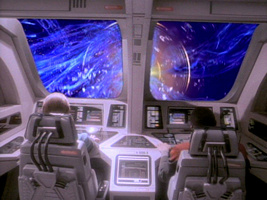
 "Emissary"
"Emissary"